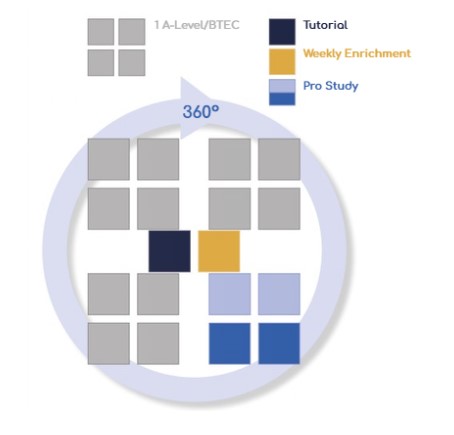Level 3
Programme of Study (for full time students)
Level 3
Collyer’s provides a fully rounded sixth form experience, designed to equip students with the qualifications, personal qualities and skills they will need to embrace future challenges and achieve their potential. Our approach supports students in developing independence and their ability to manage responsibilities as a young adult, to make a positive contribution to the communities in which they live and work.
All Collyer’s students spend at least three timetable blocks on their chosen subject(s). Tutorial, Pro-study and weekly Enrichment are allocated around subject blocks. Any remaining timetable sessions are available for independent study and small group/individual support. Across the academic year, students will also participate in a range of personal development activities including progression events, guest lectures, workshops, work experience and trips.
The college timetable consists of seven blocks of four sessions. Students fill three of these blocks with subject delivery, either taking three different subjects or a double BTEC course alongside an A-Level or single BTEC. T-Level courses will have a different course structure to incorporate work placements, and a chosen course will take up an entire programme. All students have one tutor period a week. They will have four periods of Pro-study (two of which are registered and two are not), during which time students are expected to complete work set by their subjects. Students will also have at least one period of enrichment most weeks and may choose or be directed to attend workshops for their subjects or for more general intervention when a need is identified. The remaining periods are free for students to manage their independent study, socialising on campus or meeting personal needs outside of college.
Tutorial
All students attend a weekly tutorial session as part of their programme of study. Tutors provide guidance and support through each stage of the sixth form journey and are a student’s first point of contact with any concerns or queries about their studies, progress or wellbeing. Tutors also monitor a student’s overall attendance and progress in their studies and support their development as an independent learner.
Pro Study
Pro-study is about exploring additional subject content to develop understanding and skills beyond the regular homework set following classes. Students have four 65-minute periods of pro-study per week, two of which are registered and supervised in one of the college’s library spaces. Pro-study plays an important role in helping students to manage their time well and develop the independent study skills they will need to be successful in their qualifications and beyond Collyer’s.
Enrichment
At various points during the year, students will select enrichment from a wide range of activities. Enrichment is an essential part of the sixth form experience. All students are expected to engage, each week, in an enrichment activity. There are a huge range of activities to choose from including cross-college options such as sport, DofE and performing arts; subject extension activities to develop skills beyond the curriculum; short courses to enhance wellbeing and future progression; and student led clubs and societies. We host an enrichment fair at Welcome Day and at the start of the academic year so that students can find out about the different activities on offer.
Selection of Study Programme
Students select their programme of study following a series of opportunities for specialised advice and guidance as follows:
Students have multiple opportunities to decide on the right programmes for them with tailored advice based on our entry requirements and years of specialist Sixth Form experience to guide on a programme that is most likely to ensure success
Changing Programmes:
Students are not expected to change their programme once started. In some instances, a small number of students may request a change of course within the first 6 weeks of study. Beyond that 6-week cut off, students will be committed to studying their full programme for the 2-year duration of their courses.
Autumn Term Start – Oct Half Term: Students can seek guidance from their Tutor before speaking to prospective Heads of Subject about possible course changes. Key questions to answer would be:
- For the course you are intending to drop, why did you initially want to do it and what has changed?
- What will be different about the new subject?
- Do you meet the requirements for that course?
- Have you researched the new subject, looked at the subject material and resources so that you know what to expect?
- Is thre space on that course?
- Is this course suitable for your longer-term plans?
- Are you prepared to spend the time catching up on content covered so far?
Oct Half Term – onwards: Students are now committed to the courses they have chosen. There will be occasions where motivation and achievement may waiver, but this is normal; Level 3 study is challenging and students on signing their learning agreement accept that a dedication to their studies is required. A whole range of pastoral and subject related support is on hand as and when students need it.
Extenuating Circumstances: In very extreme and rare cases, students may have significant extenuating circumstances that may require a reduced programme. This will involve careful discussions with senior pastoral staff, exploring a student’s fitness to study, alternative options such as taking a break in education and considering the help and support available. Extenuating circumstances where this may be considered include:
- Sudden and unexpected event – E.g.: medical emergency, family crisis or bereavement.
- Emerging and severe medical conditions – E.g.: suffering a new and significant health problem which affects their ability to learn and/or take assessments.
- Escalating care responsibilities – E.g.: pregnancy related leave required or increase of caring responsibilities of a sibling, parent or an elderly relative.
What if things aren’t going to plan?
If a student is finding a particular course challenging, they should consider speaking to their Tutor, their subject teacher(s) or the Head of House. Student Services are always on hand to direct students who do not know who to contact or how to contact them for support. The following graphic may be useful for identifying who to contact for support with a range of issues.
Foundation
Foundation
The Foundation programme is designed so that all students can add to their prior achievement to obtain at least 5 GCSE’s/equivalents at grade 4 or above overall. This is with the aim of helping them to qualify for level 3 the following academic year.
All Foundation students must select at least two Level 2 vocational courses (or equivalent) from the options available. These courses are in addition to any GCSE retakes they may also need to take in English Language and/or Maths.
Tutorial
All students attend a weekly tutorial session as part of their programme of study. Tutors provide guidance and support through each stage of the sixth form journey and are a student’s first point of contact with any concerns or queries about their studies, progress or wellbeing. Tutors also monitor a student’s overall attendance and progress in their studies and support their development as an independent learner.
Pro-study
Pro-study is about exploring additional subject content to develop understanding and skills beyond the regular homework set following classes. Students have four 65-minute periods of pro-study per week, two of which are registered and supervised in one of the college’s library spaces. Pro-study plays an important role in helping students to manage their time well and develop the independent study skills they will need to be successful in their qualifications and beyond Collyer’s.
Enrichment
At various points during the year, students will select enrichment from a wide range of activities. Enrichment is an essential part of the sixth form experience. All students are expected to engage, each week, in an enrichment activity. There are a huge range of activities to choose from including cross-college options such as sport, DofE and performing arts; subject extension activities to develop skills beyond the curriculum; short courses to enhance wellbeing and future progression; and student led clubs and societies. We host an enrichment fair at Welcome Day and at the start of the academic year so that students can find out about the different activities on offer.
Selection of Study Programme
For Foundation students, it’s likely that their original plan for Level 3 study has been halted due to GSCE results. Therefore, careful consideration of the next step and the creation of a new plan is needed. Students can take a Foundation year, with a view to progressing onto Level 3 providing they meet the application criteria. Choices of foundation courses should be made with progression in mind.
Changing Programme:
Students are not expected to change their programme once started. In some instances, a small number of students may request a change of course within the first 6 weeks of study. Beyond that 6-week cut off, students will be committed to studying their full programme for the 2-year duration of their courses.
Autumn Term Start – Oct Half Term: Students can seek guidance from their Tutor before speaking to prospective Heads of Subject about possible course changes. Key questions to answer would be:
- What will be different about the new subject?
- Have you researched the new subject, looked at subject material and resources so that you know what to expect?
- Is there space on that course?
- Is this course suitable for your progression plans? i.e. will it help you to prepare for the level 3 programme you hope to do next year?
- Are you prepared to spend the time catching up on content covered so far?
Oct Half Term – onwards: Students are now committed to the courses they have chosen. There will be occasions where motivation and achievement may waiver, but this is normal; on signing their learning agreement students accept that a dedication to their studies is required. A whole range of pastoral and subject related support is on hand as and when students need it.
Extenuating Circumstances: In very extreme and rare cases, students may have significant extenuating circumstances that may require a reduced programme. This will involve careful discussions with senior pastoral staff, exploring a student’s fitness to study, alternative options such as taking a break in education and considering the help and support available. Extenuating circumstances where this may be considered include:
- Sudden and unexpected event – E.g.: medical emergency, family crisis or bereavement.
- Emerging and severe medical conditions – E.g.: suffering a new and significant health problem which affects their ability to learn and/or take assessments.
- Escalating care responsibilities – E.g.: pregnancy related leave required or increase of caring responsibilities of a sibling, parent or an elderly relative.
What if things aren’t going to plan?
If a student is finding a particular course challenging, they should consider speaking to their Tutor, their subject teacher(s) or the Head of House. Student Services are always on hand to direct students who do not know who to contact or how to contact them for support. The following graphic may be useful for identifying who to contact for support with a range of issues.
Progression to Level 3
After February Half Term, Foundation students meet with their tutors for progression interviews and are given advice and guidance on their next steps. Students who wish to return to Collyer’s on a Level 3 programme will need to meet the following criteria:
- On target to achieve a Merit in their BTEC level 2 course
- On target to pass GCSE retakes (where these are a requirement for the chosen L3 courses)
- Average GOOD (grade 2’s) in studentship grades
- Good attendance (at least 90% unless mitigating circumstances)
- A record of good conduct




